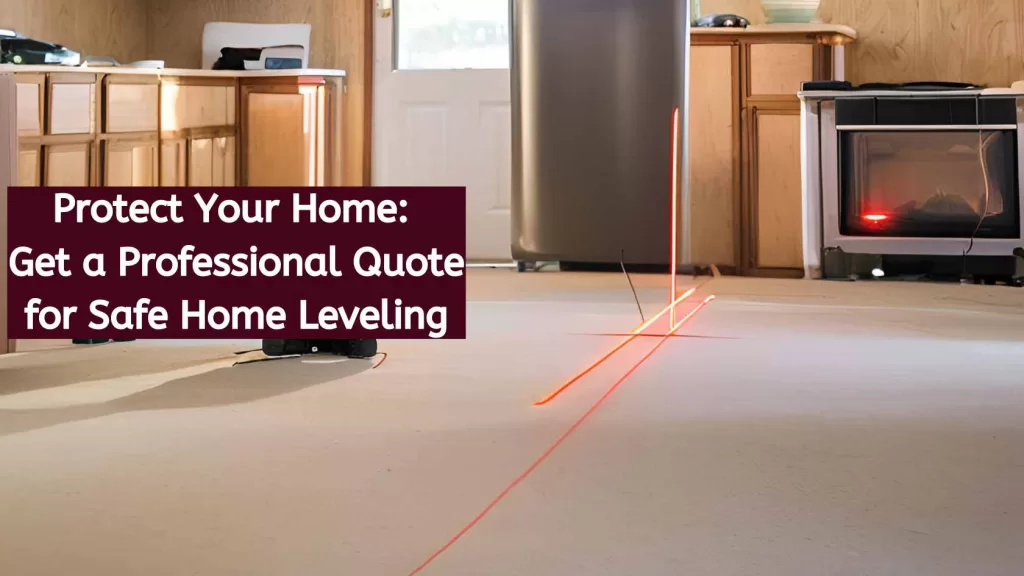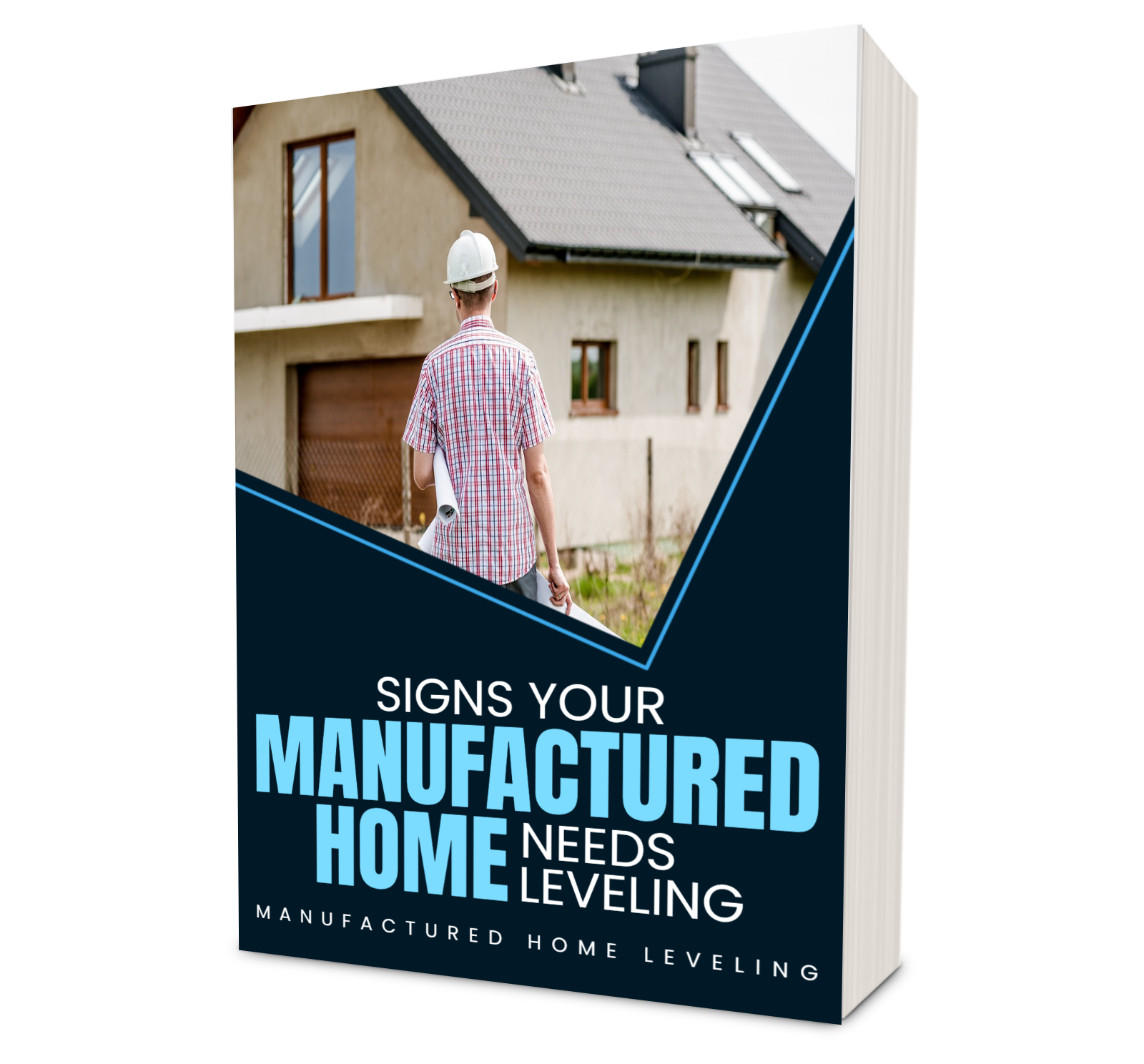How to Level Your Mobile Home with a Laser Level: Step-by-Step Expert Guide

This post contains affiliate links. We may earn a commission when you purchase products mentioned in this post. View our full affiliate disclosure here.
Are you tired of dealing with creaky floors, stuck doors, and uneven surfaces in your mobile home? If so, it may be time to consider leveling your home with a laser level. But before you start, it’s essential to understand the importance of proper leveling and how to do it correctly.
Why Leveling Matters
Leveling la mobile home with a laser level is crucial for mobile homes to ensure stability, safety, and longevity. An unlevel mobile home can lead to various issues, such as:
- Doors not closing properly
- Floors creaking
- Uneven wear on appliances and furniture
- Increased risk of water damage and structural problems
The Benefits of Using a Laser Level
Using a laser level is an efficient and accurate method for leveling your mobile home. Laser levels offer unparalleled accuracy compared to traditional leveling methods. This tool provides precise readings, ensuring your mobile home is level to within a fraction of an inch. With a laser level, you can:
- Save time during the leveling process
- Avoid costly damage to your home
- Ensure accuracy and precision
🔧🏠 Don’t wait any longer to address your home’s leveling issues
Contact us today to schedule a quote and take the first step towards a safer, more stable home. 🛠️📞
The Leveling Process: A Step-by-Step Guide
While leveling a mobile home with a laser level may seem like a daunting task, it’s more manageable than you think. Here’s a step-by-step guide to get you started:
- Prepare the Site: During site preparation for mobile home leveling, several items can affect the leveling process. Here are some common ones to look out for:
- Obstacles on the ground: Debris, rocks, branches, or other objects on the ground can interfere with the leveling process. Clear the area of any obstacles to ensure a smooth and accurate leveling process.
- Sloping or uneven terrain: If the ground is sloping or uneven, it can affect the leveling process. The laser level may not be able to provide accurate readings, or the jacks and supports may not be able to properly adjust to the terrain.
- Tree roots or underground pipes: Tree roots or underground pipes can obstruct the placement of jacks and supports, making it difficult to level the home. Identify any underground obstacles before starting the leveling process.
- Water or drainage issues: Standing water, poor drainage, or waterlogged soil can affect the stability of the home and the leveling process. Ensure the site is dry and well-drained before proceeding.
- Electrical or gas lines: Identify any electrical or gas lines that may be running under the home or nearby. These can pose a safety risk during the leveling process.
- Poor soil conditions: Soft, loose, or unstable soil can affect the stability of the home and the leveling process. Identify any soil issues and take necessary measures to stabilize the ground before leveling.
- Hidden cavities or voids: Hidden cavities or voids under the home can affect the leveling process. Identify any potential cavities or voids and fill them before proceeding.
- Existing foundation damage: Cracked or damaged foundation walls, footings, or piers can affect the leveling process. Identify any existing damage and address it before proceeding.
- Nearby structures or obstacles: Nearby structures, such as fences, sheds, or neighboring homes, can affect the leveling process. Ensure there is enough clearance to safely level the home.
- Weather conditions: Inclement weather, such as strong winds, heavy rain, or extreme temperatures, can affect the leveling process. Schedule the leveling process during favorable weather conditions.By identifying and addressing these potential issues during site preparation, you can ensure a safe and successful mobile home leveling process.
- Check for Existing Damage: Identify and address any damage that might impact the leveling process, such as cracked or broken supports, rotten or damaged flooring and uneven ground or settlement issues.
- Measure Initial Levels: Take initial measurements to understand the current state of your mobile home’s level and compare it with future measurements.
- Set Up the Laser Level: Follow the manufacturer’s instructions to set up the laser level, ensuring it’s placed on a stable, level surface, properly calibrated and set to the correct rotation speed and range.
- Identify Low and High Points: Use the laser level to identify the high and low points of your mobile home.
**The Following Steps are Recommended For Professional Home Levelers Only**
Adjust the Home’s Level: A professional home leveler will use the laser level readings to adjust the supports or jacks to bring the home to an even level.
Recheck Levels: A professional home leveler will regularly recheck the levels throughout the process to ensure accuracy and prevent mistakes.
Don’t Risk It: Get a Professional Quote Today
While this guide provides a general overview of the leveling process, it’s essential to remember that leveling a mobile home is a complex task that requires expertise and specialized equipment. If you’re not experienced in home leveling, it’s highly recommended to seek the help of a professional.
The Risks of DIY Home Leveling
While it may be tempting to attempt DIY home leveling, it’s essential to understand the risks involved. Home leveling is a complex process that requires expertise, specialized equipment, and attention to detail. Here are some of the risks associated with DIY home leveling:
- Structural Damage: Incorrect leveling can cause structural damage to your home, leading to costly repairs or even complete collapse.
- Safety Hazards: DIY leveling can create safety hazards, such as uneven floors, unstable walls, and increased risk of injury or accidents.
- Property Damage: Improper leveling can damage your home’s foundation, walls, floors, and roof, leading to costly repairs or replacement.
- Voiding Warranty: If you’re still under warranty, DIY leveling may void your warranty, leaving you with costly repairs or replacement bills.
- Insurance Issues: In the event of damage or accidents, your insurance company may not cover the costs if they determine that DIY leveling was the cause.
- Lack of Expertise: Without proper training and experience, you may not have the necessary skills to identify and address underlying issues, leading to further damage or complications.
- Inaccurate Readings: Without proper equipment and expertise, you may not be able to take accurate readings, leading to incorrect leveling and further damage.
- Equipment Damage: Using the wrong equipment or using it incorrectly can lead to damage to the equipment itself, as well as your home.
- Time-Consuming: DIY leveling can be a time-consuming process, taking away from your daily activities and responsibilities.
- Liability: If you’re not properly trained or experienced, you may be liable for any damages or injuries that occur during the DIY leveling process.
Don’t Risk It: Hire a Professional
Given the risks involved, it’s highly recommended to hire a professional to level your home. A professional will have the necessary expertise, equipment, and experience to ensure a safe and successful leveling process.
Call Us Today!
Don’t risk your home’s stability and safety. Contact us today to schedule a professional home leveling service. Our experienced team will work with you to ensure your home is level, stable, and safe.
Get a Quote Today!
Don’t risk your home’s stability and safety. Contact us today to schedule a quote for your mobile home leveling project. Our experienced team will work with you to ensure your home is level, stable, and safe.
Frequently Asked Questions (FAQs)
Can I level my mobile home without a laser level?
While it’s possible, using a laser level is highly recommended for accuracy and efficiency.
How often should I check if my mobile home is level?
Schedule regular checks, ideally every 3-6 months, to ensure your mobile home remains level.
What are the signs that my mobile home needs leveling?
Look for signs such as doors not closing properly, floors creaking, and uneven wear on appliances and furniture.
Additional Resources
- Water Level Guide
- Choosing the Right Leveling Pads for Your Mobile Home
- Understanding Mobile Home Foundations
- Professional Mobile Home Leveling: What to Expect
- Top Mobile Home Leveling Companies: A Comprehensive Review
- Understanding the Costs of Home Leveling and Re-Leveling
By following this guide and using the recommended tools and resources, you can ensure your mobile home is level, stable, and safe for years to come.
The information provided in this blog post is for general informational purposes only. We strongly recommend seeking professional help to ensure safety and proper handling. Always consult with licensed professionals for any mobile home leveling or structural repairs. Your safety and the stability of your home are our top priorities.
This website participates in various affiliate programs, which means we may earn a commission if you purchase through our links. This does not incur any additional cost to you, and it helps us keep providing quality content. Our participation in these programs does not influence our recommendations or advice, as we are committed to integrity and transparency in all our content. View our full affiliate disclosure here.
- Mobile and Manufactured Home Foundation Types: What You Need to Know!
- Everything You Need to Know About Mobile Home Leveling Wedges: Installation & Tips
- How to Level Your Mobile Home with a Laser Level: Step-by-Step Expert Guide
- Mobile Home Skirting 101: What You Need to Know Before You Buy
- Window Screens for Mobile Homes: The Essential Guide You Can’t Afford to Skip
- Mobile Home vs Trailer Home? Discover the Key Differences and Make the Right Choice!
- Modular Home vs Manufactured Home: Uncover the Hidden Differences Before You Decide!
- Mobile Home vs Manufactured Home: Which One is Right for You?”
- Professional Mobile Home Leveling: What to Expect
- Mobile Home Water Level 101: What Every Owner Needs to Know


